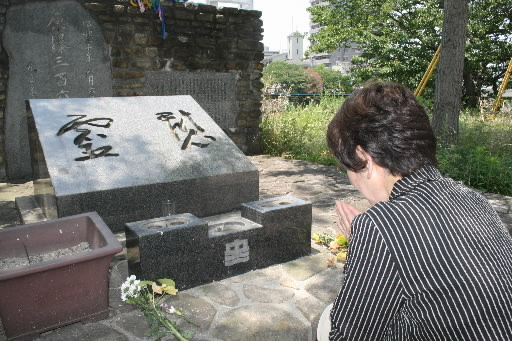Sharing the A-bomb Experience, Part 4
Aug. 2, 2009
A letter to her daughter tells her suffering
by Uzaemonnaotsuka Tokai, Staff Writer
The woman, now 80 years old, has still not shared her experience of “that summer” with her daughter. The days after the war ended, too, were filled with hardship and there were times when she thought death would be preferable.
The woman, who wishes to withhold her name, now resides in the northern part of Hiroshima City. When the atomic bomb exploded, she was in the kitchen of her home, about 1.7 kilometers from the hypocenter. She heard an enormous boom and saw an orange light. Running desperately for safety with her mother, they found her father, who had been at work, and spent the night by a river. The people around them, injured in the blast, groaned in pain and called out for loved ones. By morning, many had grown cold and stiff.
Her brother, a first-year student at Hiroshima Municipal Middle School (now, Motomachi High School), was still missing. He had been dismantling houses to help create a fire lane in Koami-cho (now, Naka Ward).
A few days later, her father brought some small bones to their friend’s house, where they were staying. He said the school had confirmed her brother’s death. Her father, holding the light bones, moaned, “We’ll never know whose bones they really are.”
Soon after, they moved to the northern part of Hiroshima Prefecture. There, people called her “the poisoned girl” behind her back and she felt miserable about their lack of understanding. When she often ran a high fever for unknown reasons and developed a bad nosebleed, her mother told her to keep it a secret. “It would make it more difficult for you to get married,” she said.
The woman almost became engaged in an arranged marriage, but she had someone tell the other family that, “I’m not well because of the bomb so I can’t marry.” Though she did not really love the man, she still felt that happiness had eluded her.
A few years later, she accepted an arranged marriage with another man, and together they had a daughter. After a divorce, she made a living as a door-to-door salesperson. She tried to make her daughter happy and dress her well.
Her daughter eventually married and she became a grandmother. She thought she could finally lead a peaceful life, but then felt something wrong with her throat and learned that she had cancer. Three years ago she underwent surgery.
“I may not have much more time to live,” she thought. As she looked back at her life while in the hospital, she mulled the memories that had been hidden away in her heart: her brother, forever missing; the people who had died by the river; the smell of bodies being cremated. “I’m supposed to live,” she decided, coming to feel that her duty, for the rest of her life, would be to convey the sorrow of the victims and the cruelty of war.
In spring 2008 she began to talk about her A-bomb experience to others. On days that she shares her painful memories, she has trouble falling asleep at night. And when she feels an unusual thirst, she worries about the cancer returning. Still, not knowing how many more opportunities she might have, she now devotes herself to speaking from the heart to students visiting Hiroshima on school trips.
And yet she cannot bring herself to tell her own daughter about this experience. Instead, she has written a letter for her daughter to read after she dies.
From time to time she visits the memorial for the students of Municipal Middle School, which stands not far from where her brother and the other students were hit by the blast. She prays no more lives will vanish from the earth, as they did, without a trace.
(Originally published on July 27, 2009)








